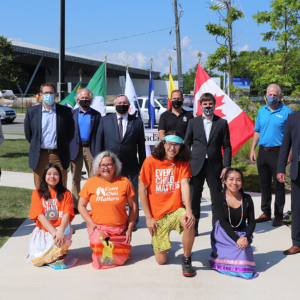TORONTO – Last week, in Toronto, one of Canada’s largest and most powerful trade unions showed its support for First Nations rights in their struggle against intrusion of big oil interests on their traditional lands.
At the Ontario Regional Council of the newly amalgamated trade union, UNIFOR –formerly the Canadian Auto Workers and Communications Energy and Paper Workers unions – the organization representing more than 300,000 workers across Canada, underscored its support of First Nations Treaty Rights.
More than 800 UNIFOR representatives gathered at Toronto’s Downtown Sheriton Hotel last week, to discuss the charter of the newly amalgamated labour force.
UNIFOR, underscores its position on upholding Native and Treaty Rights, specifically in connection with big oil corporations’ unwanted and unwelcome intrusion into traditional Onkwehon:we lands across Canada.
In a statement endorsed by National President, Jerry Diaz, UNIFOR clearly stated it supports the rights of Indigenous peoples while at the same time calling for much stricter environmental precautions and more careful planning in providing Canada with its energy needs.
“We support the rights of First Nations peoples to control what developments occur on their land, and to participate fully in the economic benefits from resource projects.”
Delegate Marilyn Vegso of UNIFOR Local 414, stood to recommend an addition to those put before the Council.
“The biggest issue facing Canada’s energy industry today is the lack of consultation and accommodation within affected First Nations territories,” said Vegso. “The environmental concerns are paramount, since most pipelines are running through various First Nations Territories. Harpers’ damn-the-torpedoes, full steam ahead, style shows no respect or recognition of the treaty rights of indigenous peoples in this country.”
“Now is the time for a new direction in Canada’s energy industry and it is one that acknowledges the reality of aboriginal title and rights to the resources on their territories.”
She challenged her union to stand in solidarity with First Nations both in talk and on the ground, shoulder to shoulder with their Indigenous brothers and sisters who are on the frontlines of resistance across Canada.
“I would like to see an addition to our recommendations to include the commitment to make our government engage in, or see to it, that meaningful consultation and accommodation with First Nations leaders who truly represent their people, is undertaken before a project begins,” Vegso concluded.
The UNIFOR recommendation was not for the total shut down of the oil sands project, but to be much better managers of it.
It recommended the creation of a Canada-wide energy grid, so that Canadian Energy resources can continue to be used, first and foremost, to meet the needs of Canadian consumers. Most of the bitumen oil being extracted from the Alberta oil sands, is destined for foreign markets while Canada is still importing most of its own energy from off shore sources.
Warnings of Prime Minister Steven Harper’s open arms policy to giant oil interests, both domestic and foreign, were also spelled out for the membership to consider.
These deals, most of which involve bypassing Native and Treaty Rights, include Enbridge Line 67 “Alberta Clipper” project; Keystone XL Northern Gateway; TransMountain Expansion; Energy East; Southern Lights; and Enbridge’s Norlite projects just to name a few.
A recent report announced this week that 40% of the Alberta Oil Sands has been bought by Chinese interests.
More locally, many concerns were raised over Enbridge’s Line 9 project, which would renovate and reverse the flow of an existing pipeline built in the 1970’s designed to carry imported oil from depots on the east coast, to refineries in Ontario. Protesters and ecological watchdogs consider this practice a disaster just waiting to happen.







